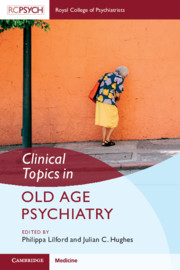Book contents
- Clinical Topics in Old Age Psychiatry
- ‘Clinical Topics In … ’
- Clinical Topics in Old Age Psychiatry
- Copyright page
- Dedication
- Contents
- Contributors
- Preface
- Acknowledgement
- Editors’ Note
- Abbreviations
- Introductory Comments
- Section 1 Epidemiology and Types of Disorders
- Section 2 Assessment and Investigations
- Chapter 9 The Home Assessment in Old Age Psychiatry
- Chapter 10 Driving in Dementia
- Chapter 11 Mini-Mental State Examination for the Detection and Prediction of Dementia in People with and without Mild Cognitive Impairment
- Chapter 12 Biomarkers and the Diagnosis of Preclinical Alzheimer’s Disease
- Chapter 13 To Scan or Not to Scan
- Section 3 Approaches to Management
- Section 4 Law, Ethics, and Philosophy
- Index
- References
Chapter 10 - Driving in Dementia
A Clinician’s Guide
from Section 2 - Assessment and Investigations
Published online by Cambridge University Press: 12 September 2020
- Clinical Topics in Old Age Psychiatry
- ‘Clinical Topics In … ’
- Clinical Topics in Old Age Psychiatry
- Copyright page
- Dedication
- Contents
- Contributors
- Preface
- Acknowledgement
- Editors’ Note
- Abbreviations
- Introductory Comments
- Section 1 Epidemiology and Types of Disorders
- Section 2 Assessment and Investigations
- Chapter 9 The Home Assessment in Old Age Psychiatry
- Chapter 10 Driving in Dementia
- Chapter 11 Mini-Mental State Examination for the Detection and Prediction of Dementia in People with and without Mild Cognitive Impairment
- Chapter 12 Biomarkers and the Diagnosis of Preclinical Alzheimer’s Disease
- Chapter 13 To Scan or Not to Scan
- Section 3 Approaches to Management
- Section 4 Law, Ethics, and Philosophy
- Index
- References
Summary
With an ageing population and more drivers on the road, the number of drivers with dementia is due to grow exponentially over the next 50 years. Although decisions regarding possession of a driving licence in the UK are made by the Driver and Vehicle Licensing Agency (DVLA), psychiatrists need to consider the DVLA guidance and inform patients and their carers of their responsibility to remain safe and legal on the roads. Doctors have a duty of care to advise patients who are unfit to drive to cease driving and to inform the DVLA of patients who pose a risk to the general public by continuing to drive when advised not to. This chapter offers a review of the literature on dementia and driving and summarizes the evidence and advice for navigating this minefield, including the recently published consensus guidelines for driving with dementia or mild cognitive impairment (MCI).
- Type
- Chapter
- Information
- Clinical Topics in Old Age Psychiatry , pp. 139 - 148Publisher: Cambridge University PressPrint publication year: 2020



